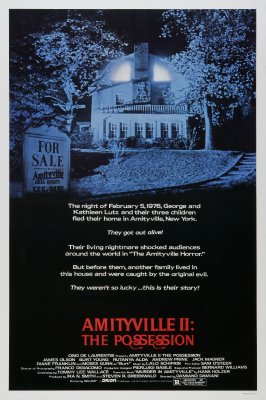
AMITYVILLE 2: THE POSSESSION
US, 1982, 99 minutes, Colour.
Burt Young, Rutanya Alda, James Olson, Diane Franklin, Andrew Prine, Danny Aiello.
Directed by Damiano Damiani.
Amityville 2: The Possession is a prequel to The Amityville Horror (1979). While the original film, produced by Dino de Laurentiis, had its excesses, especially with the frantic priest played by Rod Steiger, it was, in some ways, a more sedate haunted house than many of the features of its time. This film more than makes up for the lack of action in the original. There are all kinds of horrors, echoing so many of the films of the '70s including The Exorcist and The Omen. The film has a substantial cast which does its best with all the action which is not always the best, since most of them are eliminated. Filmed in Mexico, the direction is by Damiano Damiani, a director of sometimes lurid Italian psychological thrillers. The film, in its way, is no better and no worse than many of the films of the time. De Laurentiis made a third in the series, Richard Fleischer's Amityville 3D. While the Catholic Church was the focus of attention in the first two films, scientific research is the focus in the last film. Incidentally, the house is destroyed in each of the films.
1. The popularity of occult films in the '70s and '80s? The quality of this film in comparison? In comparison with the original? The visual and thematic links with The Exorcist and possession films? Exorcisms and haunted houses? The reliance on melodrama and special effect?
2. Production values: Mexican locations, the atmosphere of the house? The district? The church? The action within the house? The special effects for the haunting, the possession, levitations etc.? Deaths and destruction?
3. The portrait of the family and their arrival: the patriarchal background, Italian style? Happy? The role of father and his authority? Mother? Rebellion? The four children and their interaction? The elements of violence in their interchanges? The violence being manifested through the influence of the house? To death threats, violence, sexual seduction, death? The film highlighting the disrupting elements in the American family?
4. The focus on the psyche? Psychological rebellion? The violent father and his not being possessed? The mother and the blood, the bed, scratching? The daughter as victim and possessed and abused by a spirit of evil? The younger children and their drawings? The slogans: 'Dishonour thy father', the pigs?
5. Sonny as the focus of the film - his gradually being possessed? Why? The modern teenager and drug-culture, peer pressure? Sex and incest? His wanting 'to hurt God'? The birthday violence? The consequences of his possession? Murder? The visuals of the killings? The exorcism? His finally being freed and levitating with halo?
8. The background of the Catholic Church, the Credo, the Mass? Bonds with the church, Mass attendance or not? The father and his criticisms of the priest? The blessing of the house? The apology after the blessing? The blessing and the blood? The crucifix and the curtain? The crucifix upside down? The Dracula cross?
7. Father Adamski, the celebration, obliging? Meetings, visits, concern, the daughter's confession? The chancellor and his authority? Father Adamski and his decisions to free the house, ordinary clothes, hurt, not answering, guilt, nightmares, absolution? The cell and the burning? The escape? His giving up his identity for Sonny? Becoming a Christ-figure, taking on evil for others? Where was he left at the end? (The parallel with The Exorcist)?
8. Sonny's final salvation, rising like a risen crucifix?
9. The Monsignor: questions of the church, authority, obedience, the role of the individual? His peremptory style? The bishop and the summons, the forbidding of Father Adamski to exorcise? The leave of absence? Quoting the Devil?
10. Questions of celibacy? The relationship with Patricia? The visit, the party, the phone, nightmare, death? Her reappearing and tempting him? The film's insight into questions of priestly celibacy?
11. The focus on guilt in all the members of the family? Family relationships? Violence? Sexuality? The focuses on traditional attitudes of Christian sinfulness and guilt?
12. The haunted house style, the camera roaming through the house, the ominous rooms? The background research: the Indians, the graveyard, 17th century Salem, the background of witchcraft? The freeing of souls of individuals imprisoned? The thematic link between the 17th century and the 20th century?
13. The presentation of the police and their investigations? Concern?
14. The house as the gate of Hell? The ritual of exorcism and the final prayer?
15. The endings? Mutually exclusive? Melodramatic endings for this kind of horror story?